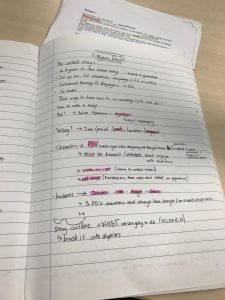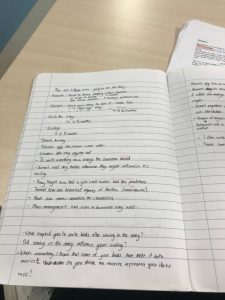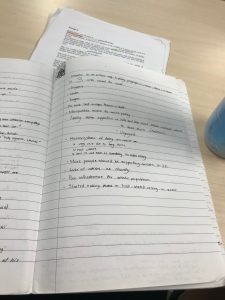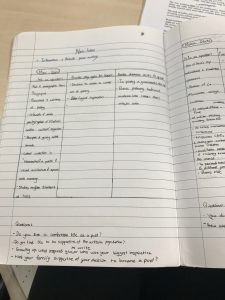More than just a “hobby.”
By Tanya Jain
A doctor saves lives. A musician makes them liveable. Doctors, teachers, musicians and artists, they all work equally hard in their individual fields of work. Does it mean one career is greater than another? No. However, some parents often consider that standardised professions lead to greater success in life enabling their children to have steady careers. Every individual has their particular strengths and weaknesses, however quite frequently, parents push their children toward an academic point of view, where grades and assessments are the number one priority in order to attain a successful job. They push their kids to pursue careers that seem stable and may bring higher salaries compared to artistic careers. Parents are our guides, our support and the only ones who will never leave our side. However, does that mean all their decisions and influences are correct? Should parents have the ability to decide our careers? Why do they prefer some careers over others?
Firstly, one of the common ideas a parent may inherit is the idea that grades and assessments determine a child’s future and represent a child’s ability. Whilst grades remain an essential part of academic ability, it mustn’t dictate what an individual can and cannot do. Parents often apply a tremendous amount of pressure on children regarding grades and marks. Some send their children to academically rigorous schools. For instance, in Singapore, local schools are required to provide a national examination (PSLE) that is administered by the Ministry of education at the end of fifth grade. In fifth grade, a child’s brain is still developing and growing, so is it right to enforce this amount of pressure on them? Furthermore, these examinations only cover academic abilities, they don’t include creativity or areas of strength in other artistic fields. This can be an unfair examination as those who may be more creativity inclined are unable to showcase their abilities. Danny Raven Tan, a modern, unique artist explained that “[he] was created to create,” however, the pressure exerted by academics often made him feel undervalued and simply not good enough.
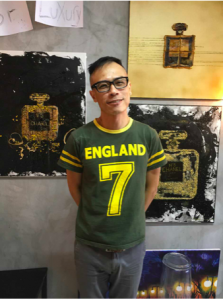 Image of Danny Raven Tan in his art gallery
Image of Danny Raven Tan in his art gallery
Furthermore, in a study conducted by University of California-Los Angeles, it was shown that children that engage in any of the various categories of the arts tend to do a better job at reading, writing and math, rather than those who focus solely on academics. Therefore, this suggests that art is beneficial to children as it not only provides a platform for children to express themselves, it can also boost their skills in other areas, such as academics. In addition, art has shown to be beneficial for one’s well being. It was found that those who took part in artistic activities had a 71% decrease in anxiety, and a 73% fall in depression rates. This proves that art is beneficial for one’s mental health and well being. So, why should we discriminate against it?
Whilst academics is crucial, “art is the most intense mode of individualism,” and it is unfair to test only one side of an individual. Therefore, the fact that many parents believe that academics should be considered with more importance than other factors implies that they prefer their children to follow traditional, standardised routes rather than explore new and creative fields of work.

 . Children expressing creativity with their parents Sandra Davie showing her A+ to her parents
. Children expressing creativity with their parents Sandra Davie showing her A+ to her parents
Everyone wants money. Everyone craves money. Everyone greeds for money. But, does everyone have money? Money is a very controversial subject and often, it can determine the career an individual may choose to pursue. Generally, parents opt to select a career for their child which would bring an abundance of money. In other words, a job which pays a higher salary is preferable to parents. Usually, a “white collar” job earns more money than an artistic profession purely because they are considered to work harder than other professions, which isn’t always the case. For instance, in Singapore, an artist is payed a substantial amount less than ‘standardised professions.’ Marc Nair, a poet and photographer originating from Singapore has also confirmed that society in Singapore have misconceptions regarding the abilities of an artist. He says that there is “poor infrastructure for [the] artistic population [and] more people should be supporting artists in Singapore.”
 Statistics showing the average revenue between non-artists and artists
Statistics showing the average revenue between non-artists and artists
Moreover, he also elaborated on some of the concerns society has surrounding aspiring artists. For instance, one of the common worries is the idea that art is not a viable job in the long-term and it’s not seen as something to make money. Essentially, people think that art is unpredictable and relies completely on the reaction of its target audience. For instance, if an artist were to paint a piece of work, the salary would depend on the reaction of the public, which could either be positive or negative, so there is no guarantee for the work to be successful.This means that it is unreliable, thus resulting in a low salary because people don’t want to offer money to an uncertain career, however, if there was proper infrastructure in society for the artistic population, people would realise the importance of art and its appropriate value. Yes, it is unpredictable, but so are other careers. All jobs have an element of risk, does it mean we just eliminate the choice of pursuing those professions? Art is used on a daily basis and is essential to many. For example, an extraordinary woman like Christina Lau realised the significance art held after she suffered a spinal cord injury as it helped her through the dark and difficult times by providing support and guidance. It offered her an opportunity to pursue a new, challenging career. She is now a renowned mouth painting artist in Singapore. So, to summarise, both professions are approximately equivalent in terms of the hard work, workload and importance. Therefore, it isn’t fair to offer one higher salary than the other which can easily lead to a parent having a biased stance toward a certain career.
On a personal level, I consider all careers to have its particular challenges and advantages and no profession is greater than another. Although, I do believe that parents are always looking out for their children and choosing the most beneficial options for them and this could sometimes mean that standardised professions are preferable because our parents have grown up in a generation where the mindset was different to ours. For instance, in India, my parents were constantly surrounded by the perspective that if you’re a girl, you become a doctor and if you are a boy, you become an engineer. If these two options weren’t followed, people tended to go into other mainstream professions. In addition, my parents also abided by this logic as my mother works at a private bank at Standard Chartered and my father works as a salesman at Hitachi. This led to my parents having a slight biased opinion in terms of which type of career I should pursue, however, they never enforced a certain career onto me. I was given the option to choose whichever career I want but I believe that growing up in an environment where I was exposed to mainstream careers urged me to pursue a similar profession. Following the typical stereotypes, I am interested in becoming a doctor however I have complete respect for other careers and don’t consider one to be superior than another. So, whilst I understand parent’s point of view in choosing their kids to have a career that is considered successful, I do think that it shouldn’t matter which career is chosen.
In conclusion, every career is equivalent in terms of the challenges and perks it faces, and ideally they should be considered with the same level of respect and honour. In our society today, sometimes, there is a slight higher appreciation for standardised professions rather than artistic professions due to multiple reasons such as salary, education, etc. This causes parents to have a biased opinion toward which career they’d prefer their children to pursue in order to provide them with a successful life. A career should be chosen according to the likes and dislikes of the child, and parents shouldn’t enforce or limit the options for a child because of their personal preference.
Bibliography:
“Singapore’s Education Changes Won’t Stop Paper Chase – Because Employers Still Look at Grades First.” Young Parents, 29 Nov. -1, www.youngparents.com.sg/education/singapores-education-changes-wont-stop-paper-chase-because-employers-still-look-grades/.
USA Today, Gannett Satellite Information Network, usatoday30.usatoday.com/news/education/2002-05-20-arts.htm.
“Primary School Leaving Examination.” Wikipedia, Wikimedia Foundation, 28 Feb. 2018, en.wikipedia.org/wiki/Primary_School_Leaving_Examination.
“Danny Raven Tan : Cancer Survivor Turned Artist Adds Eclectic Flavour to Local Art Scene.”Magzter – World’s Largest Digital Newsstand with over 9,500 Magazines, www.magzter.com/article/Lifestyle/ELEMENT/Danny-Raven-Tan-Cancer-Survivor-Turned-Artist-Adds-Eclectic-Flavour-to-Local-Art-Scene.
Slawson, Nicola. “’It’s Time to Recognise the Contribution Arts Can Make to Health and Wellbeing’.” The Guardian, Guardian News and Media, 11 Oct. 2017, www.theguardian.com/healthcare-network/2017/oct/11/contribution-arts-make-health-wellbeing.






